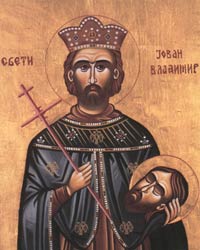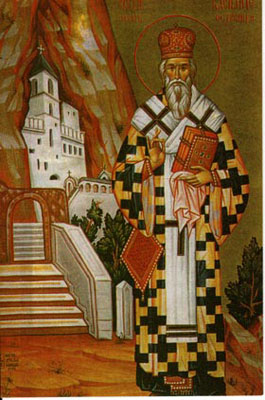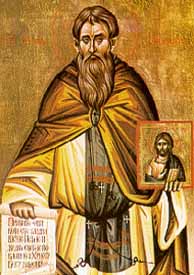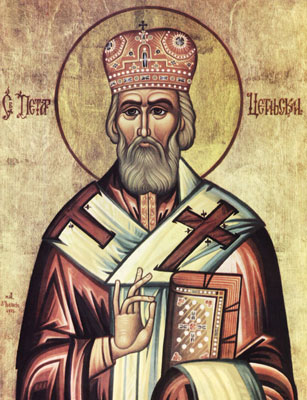Holy Martyr John Vladimir, King* of Serbia [St. Jovan Vladimir]

John Vladimir was of princely lineage from Zahumlje. His grandfather was called Hvalimir and his father Petrislav. As a ruler, he was wise, merciful, meek, chaste and brave. He fervently prayed to God and voluntarily built churches and supported them. However, he had difficult struggles both internally and externally. Internally, from heretics and the Bogomils and externally from Tsar Samuel and Tsar Basil who wanted to conquer him. Samuel deceitfully captured him and cast him into prison. While he languished in prison an angel of God appeared to him and foretold that he would shortly be freed, but that he would die a martyr's death. Getting to know him better, Samuel grew to like him and gave his daughter Kosara to be his wife. When Samuel died, his son Radomir was crowned Tsar. But Vladislav, his twin brother, slew Radomir and deceitfully summoned Vladimir and beheaded him in the year 1015 A.D. The relics of this saintly king repose uncorrupt in his monastery near Elbasan and over his relics, throughout the ages and even today, numerous miracles occur. In 1925, a church was built to honor this crowned martyr adjacent to the monastery of St. Nahum since John Vladimir was the benefactor of this glorious monastery. [Juny 4/May 22]
_______
* Jovan Vladimir was a prince (knez), although remembered in tradition as a king. According to Byzantine historian John Skylitzes, Jovan Vladimir was the ruler of Tribalia and Serbia.
Saint Basil of Ostrog [St. Vasilije of Ostrog]

Basil was born in Popova, a village in Hercegovina of simple and God-fearing parents. From his youth, he was filled with love for the Church of God and when he reached maturity, he entered to the Monastery of the Dormition (Assumption) of the Birth-giver of God in Trebinje and there received the monastic tonsure. As a monk, he quickly became renown because of his genuine and rare ascetical life. Saint Basil took upon himself mortification upon mortification each one heavier and more difficult than the last. Later, against his will, he was elected and consecrated bishop of Zahumlje and Skenderia. As a hierarch, he first lived in the Monastery Tvrdosh and from there, as a good shepherd, strengthened his flock in the Orthodox Faith, protecting them from the cruelty of the Turks and the cunning ways of the Latins. When Basil was exceedingly pressed by his enemies and, when Tvrdosh was destroyed by the Turks, he moved to Ostrog, where he lived an austere ascetical life, protecting his flock by his ceaseless and fervent prayer. He died peacefully in the Lord in the sixteenth century, leaving behind his incorruptible relics; incorruptible and miracle-working to the present day. The miracles at the grave of St. Basil are without number. Christians and Muslims alike come before his relics and find healing of their most grave illnesses and afflictions. A great people's assembly (pilgrimage) occurs there annually on the Feast of Pentecost. [May 12/April 29]
Venerable Stephan of Piperi [St. Stevan of Piperi]

This saint was born into the Niksich clan in the village of Zupa of poor but devout parents, Radoje and Jacima. According to tradition, he first lived a life of asceticism in the monastery of Moraca where he was abbot. The Turks drove him out of Moraca and he settled in Rovacki, Turmanj in the place which today is called Celishte. Later, he settled in Piperi in a cell where he remained in labor and god-pleasing asceticism until his death. He died peacefully in the Lord on May 20, 1697 A.D. His relics repose there even today and with many miracles they glorify Christ the God and Stephan, God's chosen one. [Juny 2/May 20]
St. Peter of Cetinje, Metropolitan of Montenegro [St. Petar of Cetinje]

Born on April 1st, 1749*, in the village of Njegusi, he became a monk at the age of twelve. After the death of Metropolitan Sava in 1782, Peter became Metropolitan and Governor of Montenegro. This holy man devoted his whole life to his people. Within Montenegro, he worked with his whole strength to pacify the warring tribes, and externally he defended the land and the people against plundering onslaughts, succeeding in both the one and the other. He is especially famed for his victory over Napoleon's army in Dalmatia. He was strict with himself, and just and humble towards others. He lived in one tiny cell as a simple monk, although he was governor of a people. He entered into rest on October 18th, 1830, and his wonderworking relics are preserved uncorrupt in the monastery of Cetinje. Lord glorified him in heaven and on earth as His true and patient servant. [October 31/October 18]
* More likely he was born in 1747.